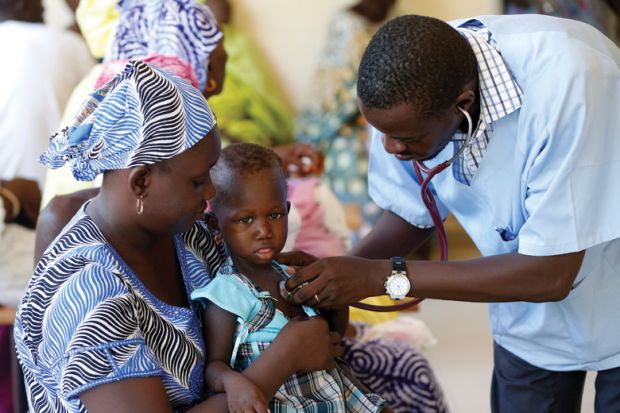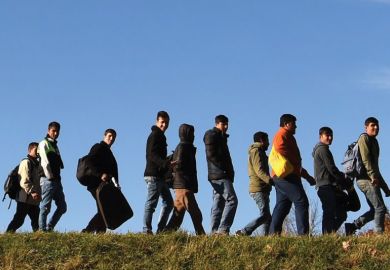How do you fix the global problems of poverty, hunger and gender inequality?
It’s an impossible task, some argue. However, last year, world leaders came together to agree a 17-point plan that may improve the lives of billions of the world’s poorest people.
Plans of action to ensure universal access to clean water, sustainable energy, healthcare and education are now being drawn up by governments across the world with the aim of eradicating inequalities by 2030.
But what role will higher education play in meeting the United Nations’ 17 Sustainable Development Goals (SDGs) and 167 related targets over the next 15 years? Does the lofty UN agenda allow enough space for academics to get involved with these global challenges?
Those issues will be tackled at the European Association for International Education’s annual conference, with representatives from the World Bank, the European Commission and Boston College due to debate the subject at a session on 14 September.
“It is fantastic that the SDGs recognise higher education as a goal for the first time,” said Andreas Blom, lead education economist at the World Bank.
“This was missed last time the goals were set in 2000 and it had a substantial impact on [the] global development agenda,” Dr Blom added.
With higher education excluded from the Millennium Development Goals, several countries and international agencies pulled their financial support for universities and colleges in the developing world, he explained.
“The World Bank gave some money, but lots of bilateral funders pulled out and focused their funding almost exclusively on basic primary-level education in the run-up to 2015,” he said.
“The latest plan recognises that you cannot just focus on primary education.”
Under the goal to provide “inclusive and equitable education and promote lifelong learning opportunities for all”, the UN states that all women and men must have “equal access…to affordable technical, vocational and tertiary education, including university”, while it also urges countries to increase the number of scholarships to enable the poorest to access higher education.
“We need to have higher education institutions and governments responding to these questions,” said Dr Blom, who believes that financial support for students is often too focused on middle-income families, rather than the poorest.
“There is an understanding that primary education is financed by the government, but countries leave students to fund the full cost of their university studies, which is not possible for the poorest people,” he added.
While many have welcomed the arrival of policies relating to tertiary education in the SDGs, others believe that the sector is mentioned too fleetingly. If society is to fix some of its biggest problems, academics will need to be at the heart of finding the solutions, critics argue.
“If you are building dams to improve water security, universities will provide the local science and technology expertise,” Dr Blom said.
“The goals set around health cannot be met unless you have substantial investment in training local people,” he added, saying that universities and related hospitals were good places for this to happen.
The outbreak of the Ebola virus in West Africa in 2013 showed the importance of having skilled local staff in place, he said.
“The Ebola crisis showed if you do not have someone that tests for a virus in a country, you will not have the capacity to respond quickly to an emerging problem,” Dr Blom added.
Engaging academics with local societal challenges would help to “reframe” the idea of higher education in many countries, where it is often seen primarily as a place to educate civil servants or engineers, he added.
“If you don’t do this, you will not have top talent learning in African universities, so you need to reframe higher education to give academics more autonomy to engage outside their institution,” he added.
Given how many of the UN’s goals overlap, it will be universities that are best placed to provide the interdisciplinary know-how required to achieve many of the interlinking targets, argued Balasubramanyam Chandramohan, a senior research fellow at the University of London’s Institute of Commonwealth Studies, who co-chaired a symposium on SDGs in April.
“Universities have expertise in operating at multi-faculty, multi-departmental and multi-unit levels,” said Dr Chandramohan, who added that they also knew how to “operate across discrete but structurally linked branches of knowledge and categories of problems”.
“An overall strategy on the SDGs is needed to avoid ending up with 17 SDG silos [followed by] the self-congratulatory evaluation of ‘achievement’ of individual goals,” he added.
“UN Sustainable Development Goals and the role of higher education” will take place on 14 September at 4pm (Room 3B, Level 1, ACC).
Register to continue
Why register?
- Registration is free and only takes a moment
- Once registered, you can read 3 articles a month
- Sign up for our newsletter
Subscribe
Or subscribe for unlimited access to:
- Unlimited access to news, views, insights & reviews
- Digital editions
- Digital access to THE’s university and college rankings analysis
Already registered or a current subscriber?




